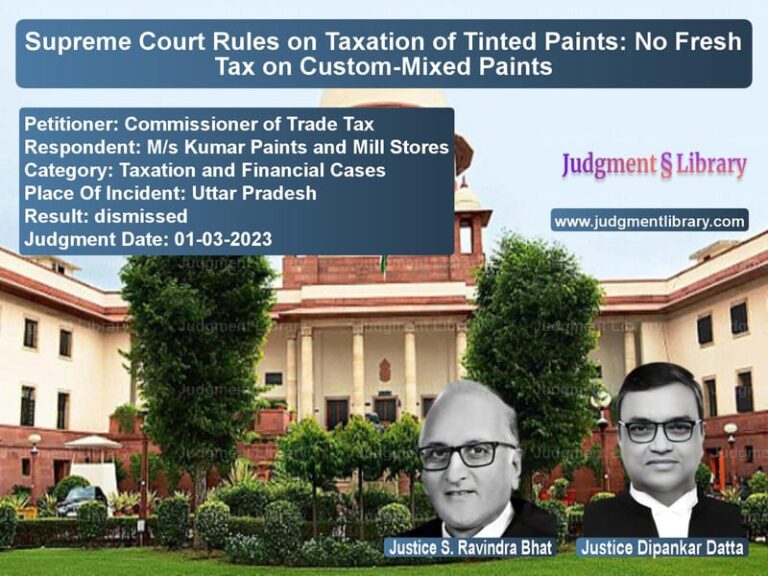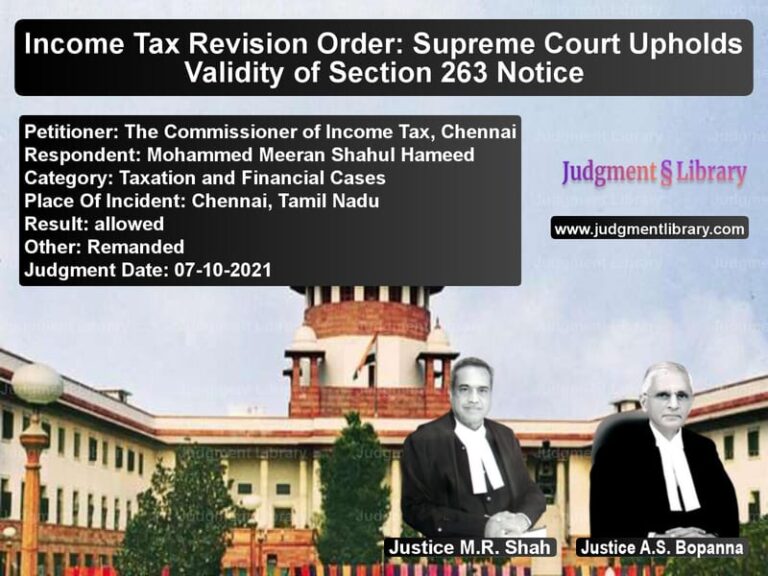Supreme Court Restores NCLT’s Approval of Resolution Plan in Insolvency Case
The Supreme Court of India, in the case of The Karad Urban Cooperative Bank Ltd. vs. Swapnil Bhingardevay & Ors., ruled on a significant insolvency dispute concerning the resolution of corporate debt under the Insolvency and Bankruptcy Code, 2016 (IBC). The judgment clarified the role of the Committee of Creditors (CoC), the scope of judicial review in insolvency proceedings, and the application of commercial wisdom in approving resolution plans.
The Court set aside the National Company Law Appellate Tribunal (NCLAT) ruling that had remanded the resolution plan to the CoC for reconsideration. Instead, it upheld the decision of the National Company Law Tribunal (NCLT) in approving the resolution plan.
Background of the Case
The case arose when The Karad Urban Cooperative Bank Ltd., a financial creditor, initiated insolvency proceedings against M/s Khandoba Prasanna Sakhar Karkhana Limited, the corporate debtor. The NCLT admitted the application and appointed a Resolution Professional (RP) to manage the process.
The CoC held multiple meetings and eventually approved a resolution plan submitted by M/s Sai Agro (India) Chemicals. This plan was then submitted for NCLT approval. However, the promoter of the corporate debtor challenged the plan, arguing that it was not viable and contained errors regarding asset ownership.
The NCLT, after reviewing all aspects, approved the resolution plan on August 1, 2019. The promoter then appealed to the NCLAT, which set aside the approval and remanded the matter back to the CoC for reconsideration.
Legal Issues and Arguments
The key legal issues before the Supreme Court were:
- Whether the NCLAT was correct in remanding the resolution plan back to the CoC.
- Whether the resolution plan met the viability and feasibility criteria.
- Whether alleged breaches of confidentiality and asset ownership disputes justified setting aside the resolution plan.
Arguments by the Petitioner (Karad Urban Cooperative Bank Ltd.)
The petitioner, represented by Senior Counsel, argued:
- The NCLAT exceeded its jurisdiction by interfering with the commercial wisdom of the CoC.
- The viability and feasibility of the resolution plan had been fully considered by the CoC and could not be challenged in court.
- Allegations of confidentiality breaches were unsubstantiated and did not impact the resolution process.
- The ethanol plant issue was known to all parties, and the resolution applicant accounted for its potential unavailability.
Arguments by the Respondents (Swapnil Bhingardevay & Others)
The respondents, represented by Senior Counsel, countered that:
- The resolution plan failed to consider that a key asset—the ethanol plant—belonged to a different company.
- The liquidation value was leaked to the resolution applicant, violating confidentiality rules.
- The CoC’s decision was rushed and lacked proper due diligence.
- The NCLAT’s decision to remand the matter was justified to ensure fairness in the resolution process.
Supreme Court’s Ruling
On the Role of the CoC and Judicial Review
The Supreme Court reiterated that the commercial wisdom of the CoC is paramount in insolvency proceedings. Citing K. Sashidhar vs. Indian Overseas Bank and Essar Steel India Ltd., the Court emphasized that:
- The CoC has the expertise and responsibility to assess the viability and feasibility of resolution plans.
- Courts cannot interfere in CoC decisions unless they violate the IBC’s statutory framework.
- The NCLAT’s decision to remand the resolution plan lacked a legal basis.
On Confidentiality and Liquidation Value
The Court rejected the claim that the liquidation value had been leaked to the resolution applicant, stating:
- There was no concrete evidence of misconduct.
- The resolution applicant’s bid was significantly higher than the liquidation value, negating any unfair advantage.
On the Ethanol Plant Dispute
The Court found that the ethanol plant ownership issue was well-known and accounted for in the resolution plan. It ruled that:
- The resolution applicant had proposed alternative solutions if the asset was unavailable.
- The CoC was aware of the issue and still approved the plan.
Final Decision
The Supreme Court set aside the NCLAT order and restored the NCLT’s approval of the resolution plan, concluding that:
- The CoC’s decision was made with full awareness of all relevant facts.
- The NCLAT’s intervention was unwarranted and exceeded its jurisdiction.
- The resolution process had followed due process, and the plan should be implemented.
Legal Principles Established
This ruling reinforces several key legal principles:
- Finality of CoC Decisions: Once the CoC approves a resolution plan, judicial intervention is limited.
- Protection of Resolution Processes: Allegations of procedural lapses must be supported by strong evidence.
- Business Continuity: The goal of the IBC is to maintain the corporate debtor as a going concern.
Conclusion
The Supreme Court’s decision in The Karad Urban Cooperative Bank Ltd. vs. Swapnil Bhingardevay & Ors. strengthens the legal framework for insolvency resolution in India. By emphasizing the importance of CoC decisions and limiting judicial interference, the Court has reinforced the efficiency and effectiveness of the IBC.
This judgment serves as a guiding precedent for future insolvency cases, ensuring that resolution plans approved by creditors are upheld unless there is clear statutory violation.
Petitioner Name: The Karad Urban Cooperative Bank Ltd..Respondent Name: Swapnil Bhingardevay & Ors..Judgment By: Justice V. Ramasubramanian.Place Of Incident: Mumbai, Maharashtra.Judgment Date: 04-09-2020.
Don’t miss out on the full details! Download the complete judgment in PDF format below and gain valuable insights instantly!
Download Judgment: The Karad Urban Coop vs Swapnil Bhingardevay Supreme Court of India Judgment Dated 04-09-2020.pdf
Direct Downlaod Judgment: Direct downlaod this Judgment
See all petitions in Bankruptcy and Insolvency
See all petitions in Corporate Compliance
See all petitions in Company Law
See all petitions in Shareholder Disputes
See all petitions in unfair trade practices
See all petitions in Judgment by V. Ramasubramanian
See all petitions in allowed
See all petitions in Modified
See all petitions in supreme court of India judgments September 2020
See all petitions in 2020 judgments
See all posts in Corporate and Commercial Cases Category
See all allowed petitions in Corporate and Commercial Cases Category
See all Dismissed petitions in Corporate and Commercial Cases Category
See all partially allowed petitions in Corporate and Commercial Cases Category







